You are using an out of date browser. It may not display this or other websites correctly.
You should upgrade or use an alternative browser.
You should upgrade or use an alternative browser.
Bono to Receive Atlantic Council Humanitarian Leadership Award
- Thread starter bonocomet
- Start date
The friendliest place on the web for anyone that follows U2.
If you have answers, please help by responding to the unanswered posts.
If you have answers, please help by responding to the unanswered posts.
SBU2
War Child
With a quick look i thought half of these were from 2001. Have to say the purple/blue shades look alot better than the red/organge ones he wears often.
BonoFox1
Blue Crack Supplier
u2jesusgirl
Daisy

u2jesusgirl
Daisy

Andreianloth
Blue Crack Addict
Aww xD
You know, if he grows a bit of longer hair at the back of the head, he'll have a sort-of mini-mullet!
YEAH...well thinked




u2jesusgirl
Daisy

Andreianloth
Blue Crack Addict
I luuuuuuuuve his blue glasses,makes his pretty BLUE eyes shine through


U2_Jackie
Refugee
- Joined
- Dec 29, 2009
- Messages
- 1,446
thats what I was thinking! his eyes look really really Blue! 
(and he still doesn't look like a person who's about to turn 50 )
)
(and he still doesn't look like a person who's about to turn 50
U2_Jackie
Refugee
- Joined
- Dec 29, 2009
- Messages
- 1,446

Andreianloth
Blue Crack Addict
thats what I was thinking! his eyes look really really Blue!
More than EVER

BonoFox1
Blue Crack Supplier
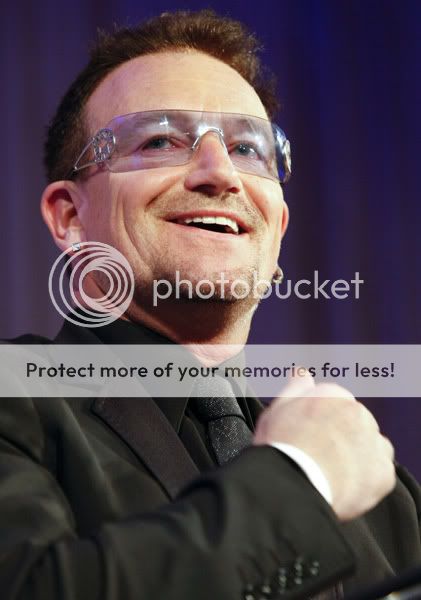
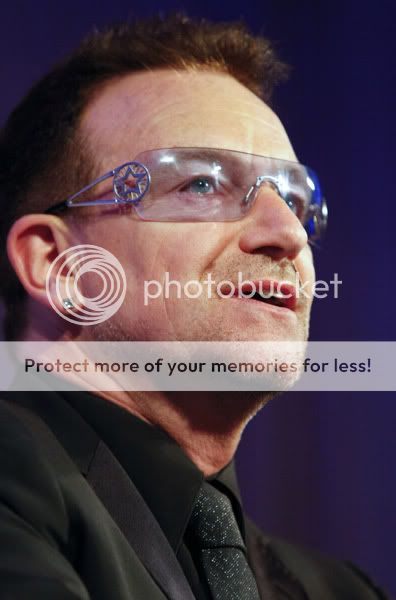
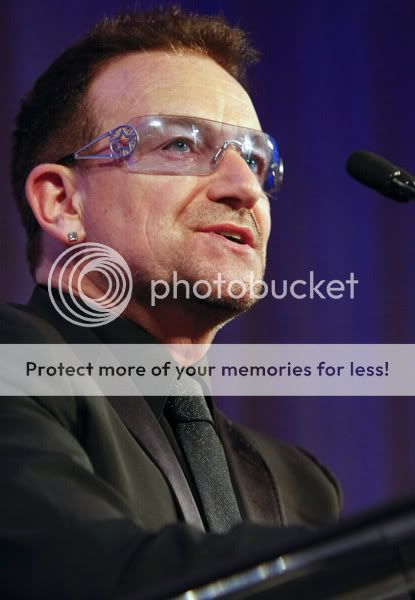
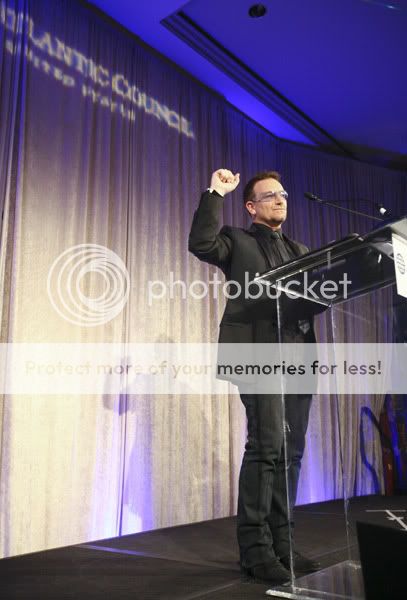
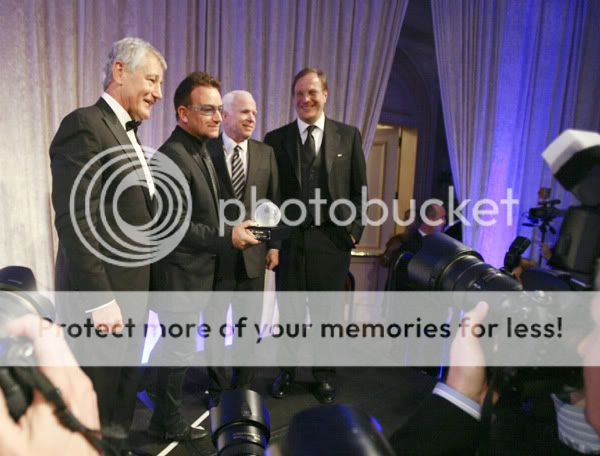
BonoFox1
Blue Crack Supplier
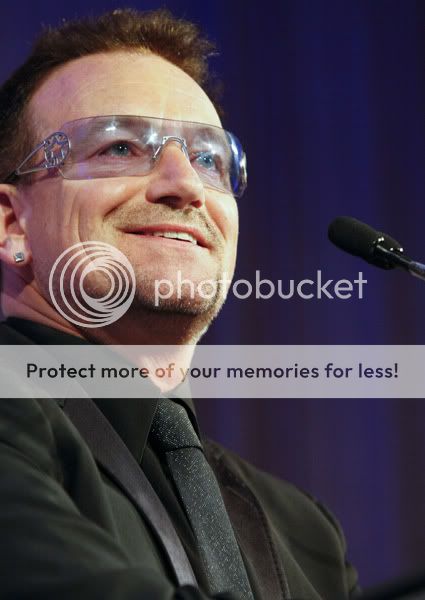
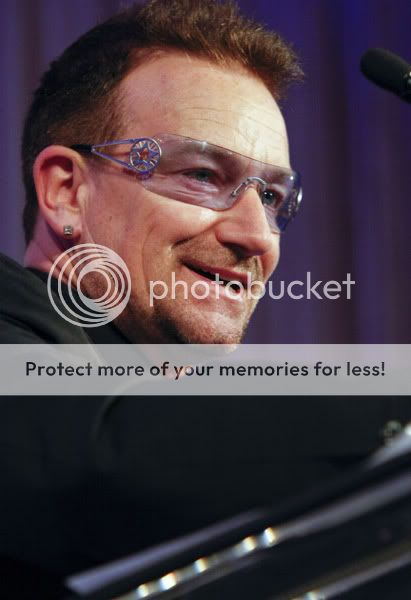
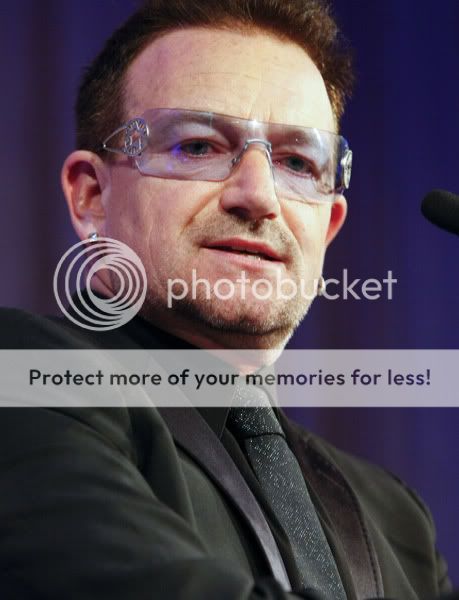
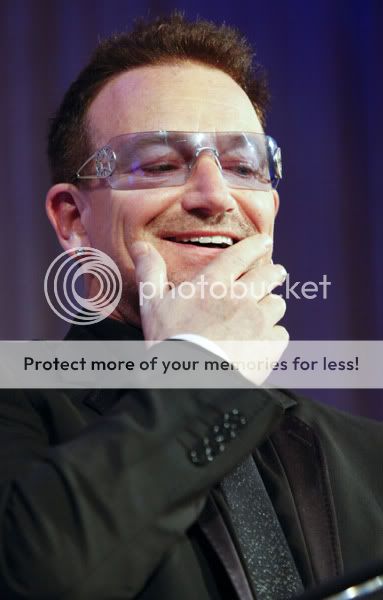
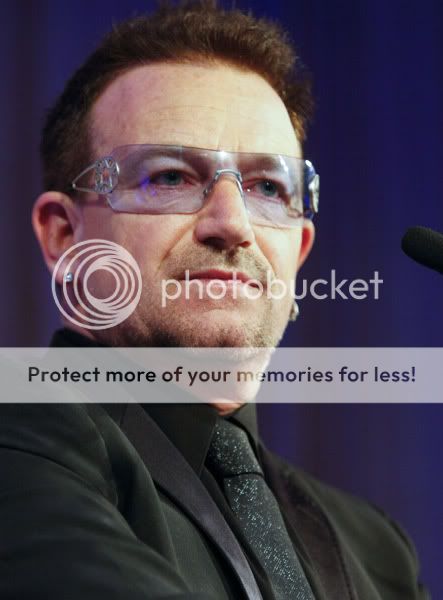
Andreianloth
Blue Crack Addict
BIGGER


I have no more comments *dies*


I have no more comments *dies*
BonoFox1
Blue Crack Supplier
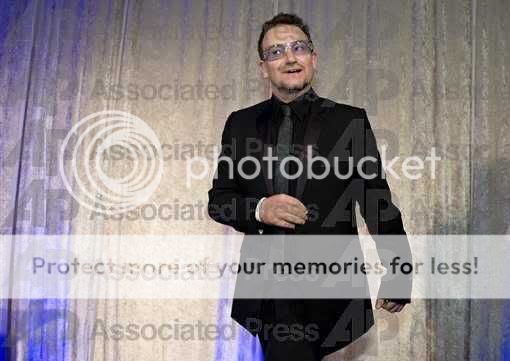


I'll try to get these without the watermarks when I get home-I have access to them there
lauramullen
Blue Crack Distributor
- Joined
- Aug 9, 2002
- Messages
- 52,111
Thanks Cecy. 

Andreianloth
Blue Crack Addict
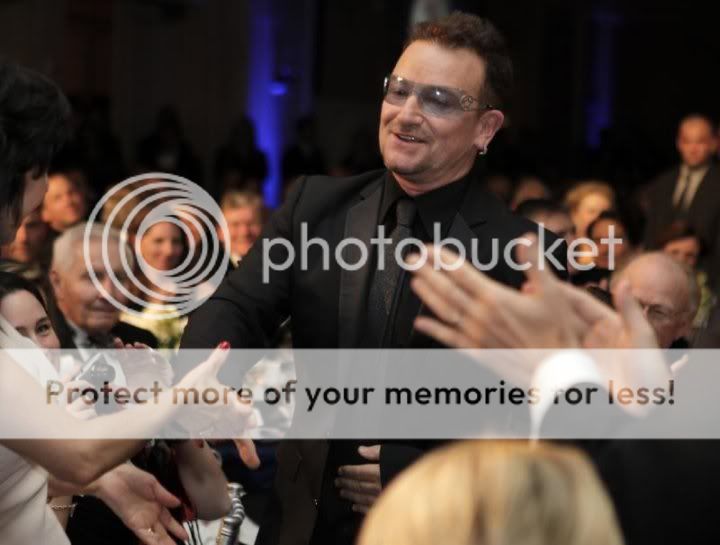
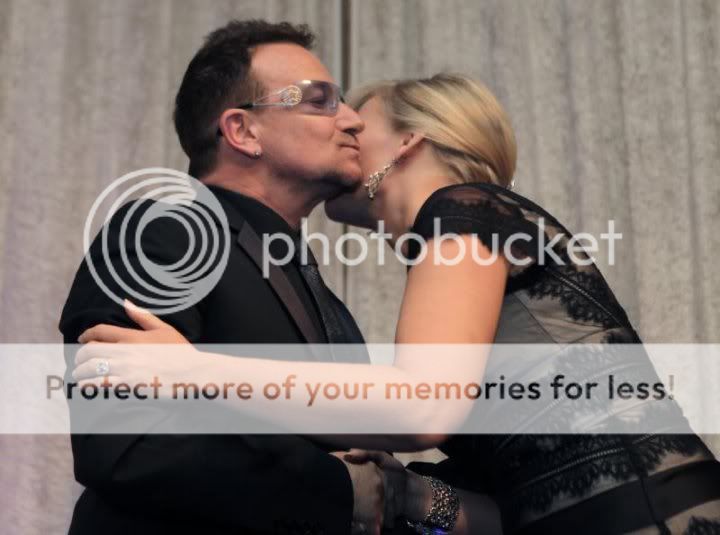
Andreianloth
Blue Crack Addict
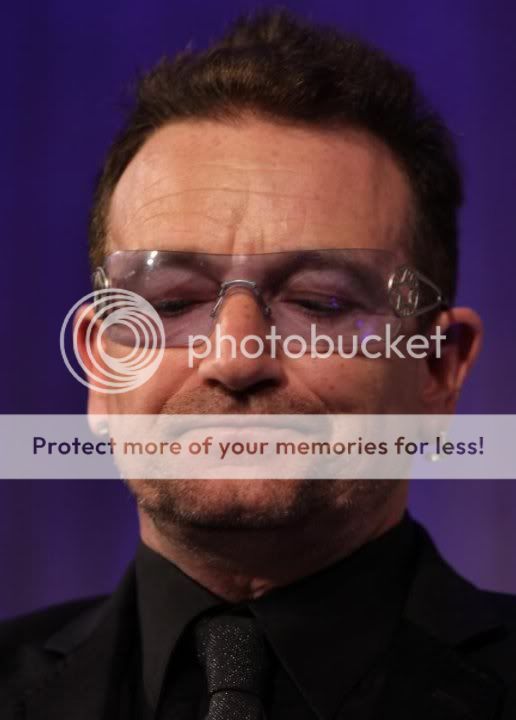

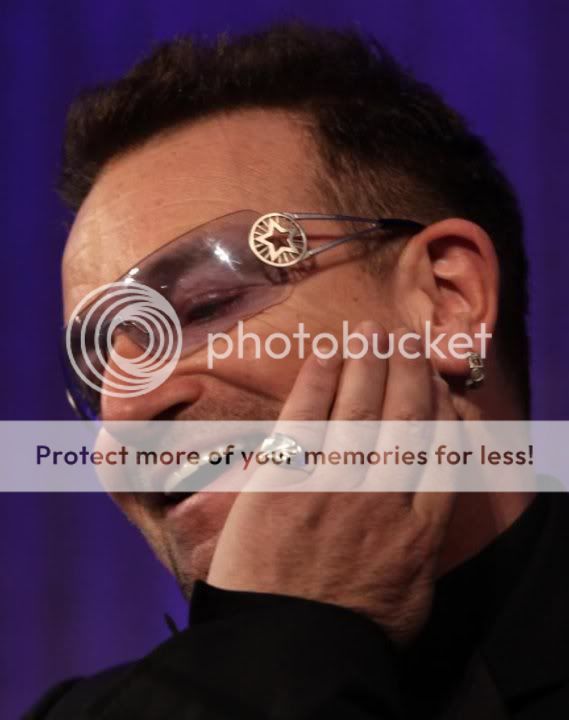
Andreianloth
Blue Crack Addict

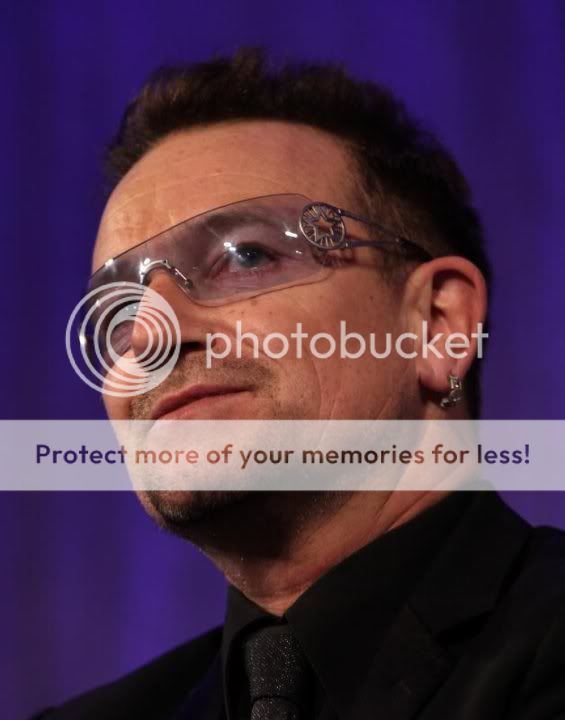
Andreianloth
Blue Crack Addict

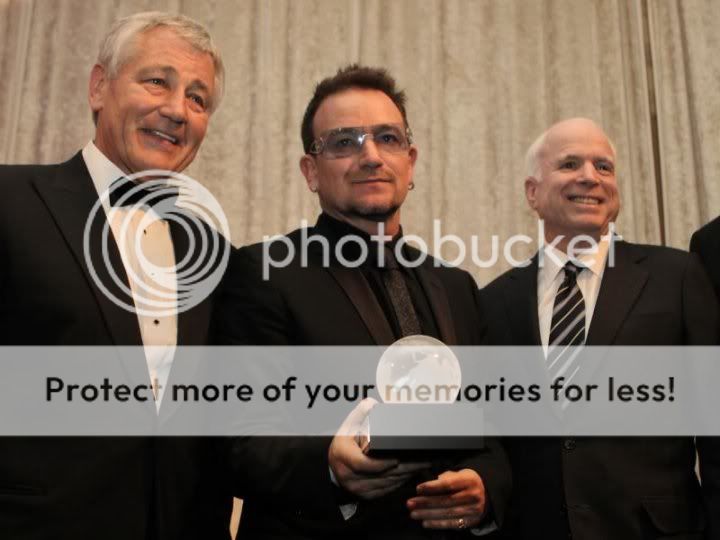
Andreianloth
Blue Crack Addict
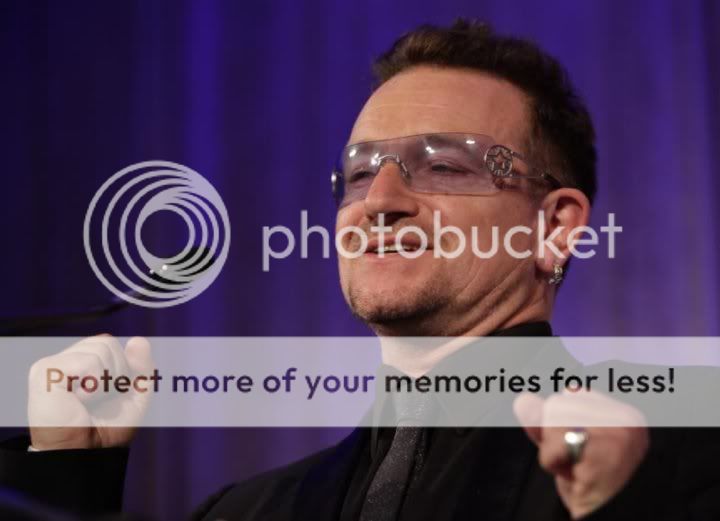
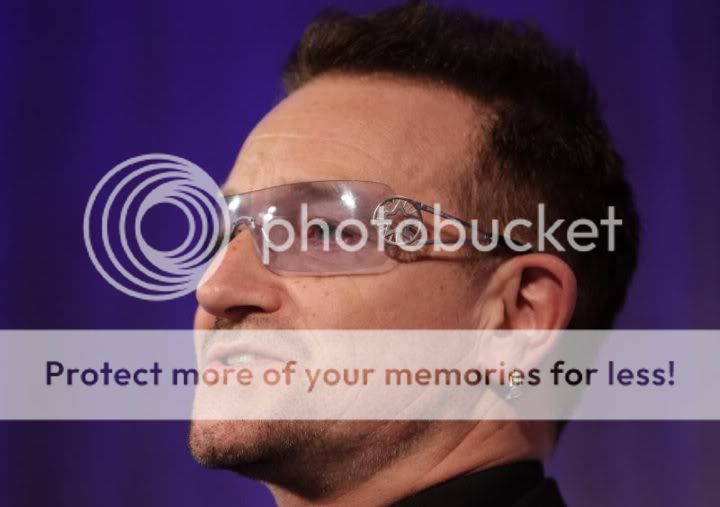
Jeannieco
Rock n' Roll Doggie Band-aid
Beautiful pictures! Love the blue shades, love the LOVE in his eyes and the tears.
What a lovely man he is.

What a lovely man he is.


U2_Jackie
Refugee
- Joined
- Dec 29, 2009
- Messages
- 1,446
!! I just noticed that aww lolBeautiful pictures! Love the blue shades, love the LOVE in his eyes and the tears.
What a lovely man he is.

U2_Jackie
Refugee
- Joined
- Dec 29, 2009
- Messages
- 1,446
we really need video of this speech!
U2_Jackie
Refugee
- Joined
- Dec 29, 2009
- Messages
- 1,446
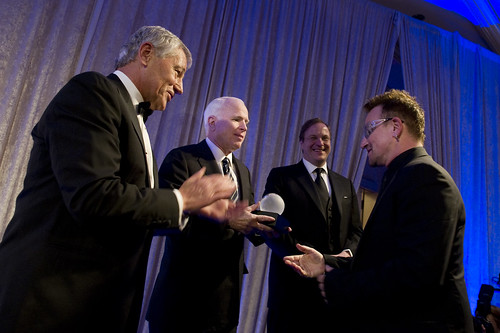
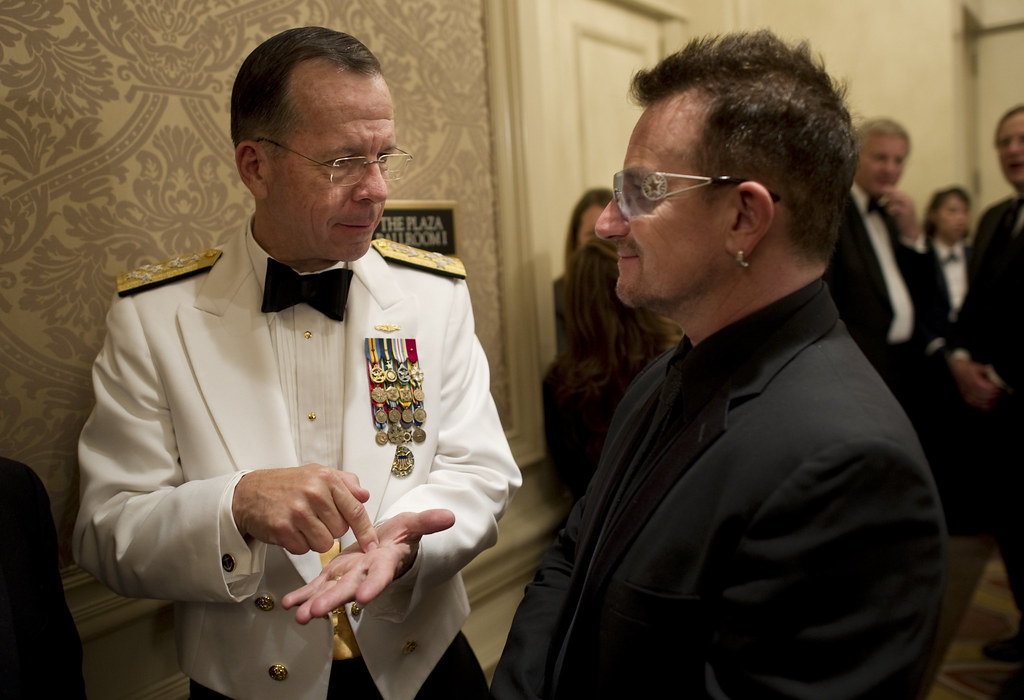
Guguza
Refugee
awwww Bono has the world in his hands
Awwwww I've got the same thought...

hcbiggs2002
Rock n' Roll Doggie FOB
U2_Jackie
Refugee
- Joined
- Dec 29, 2009
- Messages
- 1,446
here's the transcript of Bono's speech:
Bono, Lead singer of U2, Co-Founder of ONE and (RED)
Wednesday, April 28, 2010
BONO: This really isn’t the Grammys, no. (Laughter.) Wow, yeah. Thanks, John. Thank you so much for that. I’ve just found John’s notes. He left out the bit about really tall? (Laughter.)
No, thank you for your generous introduction. And more importantly, thank you for giving us the time of day, and more than that, when you were running for president. You might not think of John McCain as an activist for the world’s poor but he is, and Cindy too.
I think he mentioned all the ONE Campaigners that used to turn up on the road when he was running for president – I think it was 17 – (laughter) – times he – (chuckles) – 17 times when he brought them up on stage and put on the ONE wristband.
And I met one of these volunteers and he said, I gave the wristband to John McCain and he wore it. I said, that’s great. He said, yeah, he called me a jerk. (Laughter.) I said, what did you do to him? And he said, no, no. He said, for John McCain, “jerk” is a term of endearment. (Laughter.) So I just thought – (chuckles). I love you. Thank you. (Laughter.)
So the other thing that was really important is in the campaign, neither candidate – any of the candidates – ever played politics on this issue of human development and the poor. And that was a great thing for us to see, that they just – there just – that was the one thing they could all agree on.
Now, I look at John McCain, a former military guy; I look out at this audience; a lot of military past and present, a lot of brass, spit and polish. And I wonder who let the peacenik in? (Laughter.) I mean, you know, you must be wondering.
And I want to answer the question with a question of my own: Who are all the other peaceniks that are in this room and the ones with the stars and bars on their formalwear? You, because I’m talking to you, military men and women, as well as the politicians who’ve been out there making our argument for us and making it so powerfully: the idea that America has a stake in the ending of extreme poverty. It’s an extraordinary thing to see.
There’s a lot of you and I want to thank you. These peaceniks, like that cat Billy Clinton from Arkansas – (laughter) – I mean, here’s an extraordinary guy who’s – not just his work that he’s done with President Bush in Haiti but negotiating the prices of life-saving anti-retroviral drugs to fight AIDS and making sure that the prices are down or free. He’s really changed the game for us in the fight against HIV/AIDS.
I first met him when we were working on debt cancellation and he kicked that off and it was followed through by his successor brilliantly. And between those two presidents, I can tell you they really made an enormous difference particularly on the continent of Africa. And I can report to you this evening that as a result of debt cancellation – and I see Cardinal McCarrick here too, another activist for debt cancellation. As a result of debt cancellation, there are an extra 40 million children going to school on the continent of Africa. That’s an extraordinary – (applause) – extraordinary.
And how about that cat, Bob Gates? He’s done a lot of covert work in his time – black ops – but who’d have thought he’d be calling a budget chairman to fight for the 150 Foreign Assistance account? A secretary of defense who hammers Congress for more aid? I mean, are you people on drugs? (Laughter.) It’s like, what is going on?
That other well-known hippie, Jim Jones – (laughter) – I mean, Gen. Jones just blew my mind a few years ago. He rang me up at home one weekend in Dublin. My boy John, little boy, so excited, he says, Daddy, there’s a general on the phone for you. (Laughter.) Does he have a tank? (Laughter.) I said, yes, yes, John, lots of them. (Laughter.) And other stuff. (Laughter.)
But Gen. Jones wanted to talk about the work we were doing on the ONE Campaign and he said some very striking things. He said, you know, I’m a Marine, Bono. I said, yes, yes, I know – sir! (Laughter.)
He said, the men and women of the Marine Corps are the most extraordinary people on the planet. And he talked about Omaha Beach; he talked about the courage it takes to lay down your life. And he said, you know, these brave men and women, they don’t mind taking hostile fire for the right reasons. But he said, they do mind taking hostile fire for the wrong reasons.
I asked the general, what’s the wrong reason? He said, for being American. It kind of sent a shiver down my spine. He said, when people have the wrong idea about us. He sensed that Americans wanted to show the world what they were for as well as what they were against.
And he told me that the fight against poverty reminds the world of American values which in turn helps to make America more secure. He was incredibly knowledgeable about all development stuff and I was really taken aback with him.
Now, why did the general’s words send such a shiver down my spine? If you haven’t noticed, my spine is Irish, and why should I care? Well, because all of us have a stake in this word “America.” From rock stars in D.C. to street kids in Rio from Harlem to Haiti from Cape Town to Cairo, we all have a stake in this word “America.”
Now, why? That’s because America is not just a country; it’s an idea. Ireland is a great country. I love it. It’s been everything to me. It’s not an idea. This country is an idea and it’s a great idea. So we fight, we argue, we bitch, we protest, we pontificate, we sound off like I am tonight because we know somewhere in our waters that this place is not just a country. It’s an idea, a contagious thought; not just a physical landscape or a people defined by their borders.
And I just wanted to tell you tonight that I really believe in the idea of America and I believe in it because at its core is a three-corded strand as important to me as rhythm, melody and harmony. I’m talking about equality, justice and opportunity for all. That’s a catchy melody you’ve got there. (Applause.)
However, with implications. And the piece we’ve got to review constantly is the idea of justice. You see, I don’t come at the poverty-fighting business from the point of view of charity. I come at it from the point of view of justice. And I know that many of you do, too. And I’m deeply moved to discover that many of you who are here are equally offended by the hemorrhaging of human life around the world, especially when we know that not-too-costly interventions can stop the bleeding.
Now, I know the cost of life is very real in your world in this room. I can’t even imagine. But what I think Gen. Jones, Secretaries Gates and Clinton, Sen. McCain and others are getting at is that somehow these worlds of defense and development are inextricably linked. They’re not the same thing; they’re very different. But they’re linked and we need to see them as part of the same picture. They’re both essential if we really want to build a world that’s more secure, more prosperous and more justice. And it’s more important than ever that we see those connections especially in asymmetrical conflicts.
Winning the peace, we hear, is critical to winning the war. But even better would be not having to go to war in the first place, right? So you don’t have to be a number cruncher or a policy wonk to see that bad governance, economic stability and poverty have something to do with political rest and even violence. It’s not a coincidence that when civil war breaks out in Sierra Leone, it’s a country with a per capita income of $180 a year. It’s not a coincidence that soaring food prices led to widespread riots not just in Africa but in many places.
I just spent most of the month of March in sub-Saharan Africa. And I want to tell you, the energy is really extraordinary. People are just bursting to shatter all the stereotypes of doom and gloom. And they will; they really will. And if you don’t take my word for it, you should (doorstep ?) the brilliant Mo Ibrahim if you spot him around here – an amazing African man, new leader, I just want to – (applause). He made the trip for me.
But we can’t ignore some of the current realities. You take drought and desertification, caused in part by deforestation across the Sahel in Africa from Somalia to Nigeria. The physical devastation makes poor communities more poor and more vulnerable to extremism.
If you ask Baaba Maal, the amazing Senegalese bluesman who is going to play for us tonight, I think Baaba is descended from the Fulani tribe – isn’t that right, Baaba? – and they roamed the vastness of the Sahel for a thousand years.
Violent extremism does not always play a big role in these conflicts but it’s circling them. Nigeria, an extraordinary, populous country, nearly 130 – 150 million, maybe. It’s the whole of West Africa in many ways; a Muslim and Christian nation, has lived by and large totally stable existence; harmony between the two religions. But in Northern Nigeria, there are signs that that’s changing, as you’ve probably read about.
Our belief in justice or enlightened self-interest is in agreement here. It’s crucial for all of us that poor and fragile economies succeed. There’s a lot we can do before anyone has to send in the helicopters, or as we were saying, so that we never have to send in the helicopters. And what we should do, we have to do in concert. And that’s why the ONE Campaign being honored tonight at the Atlantic Council is so important to us.
I am not suggesting that we do each other’s jobs – far from it. I’m not suggesting that soldiers start wearing flowers in their hair or carrying stethoscopes or fertilizers in their packs, neither am I saying that peaceniks like me should put on combat helmets, you’ll be very relieved to hear – and that would be very scary actually.
There’s a bright line that separates what we do from what you do, and that’s okay. But our ultimate goals are the same goals, so let’s not work at cross purposes. While the military helps build, keep the peace by supporting the African standby force peacekeeping efforts, development must be an equal but separate partner. (Applause.)
It’s up to development experts supporting governments and citizens in the development countries to fight poverty and disease, to build institutions for good governance, reward transparency and promote prosperity.
Aid can actually be a reforming tool – the new, smart aid. And when I’m talking about the idea of America, that’s what I’m talking about. And it’s an idea that Europeans like me, and Europe generally, can get behind. When the most powerful nation on earth puts its creativity, its moral purpose, its strategic sensibilities to work, the world shifts, the world shifts. It has before and it will again. And that’s why I’m talking about the idea of America.
But no idea that stays the same survives for very long. America is an idea that has to be reborn as it’s being redescribed to the world. Isn’t that what Lincoln said? You have to think anew.
Well, I say to you that the interdependence of development and security really needs to be understood for the safety of your troops, the protection of your national purse and the betterment of lives around the world. It is smarter and cheaper to make friends than to defend yourself against enemies later. (Applause.)
So I’m not a professional here, but I refer to your national security strategy. As I understand it, it’s based on the three Ds: defense, diplomacy and development. The last two Ds get a fraction of the government budget compared to the first. You knew why I came. (Chuckles.) Just a fraction. And development gets even less if Sen. Conrad has his way. So let’s be sure we give the last two D’s enough love.
So you peaceniks in combat fatigues, you’ve got a job to do over the next weeks. And maybe you agree with the combat veterans you saw on the intro tape there who joined us on the ONE Campaign. I’ll tell you, these men and women, they embody the idea like no one else: the idea that power brings responsibility; the idea that people, not their rulers run the show; the idea that all men are created equal; that we are endowed by our Creator the certain unalienable rights and that among these are life, liberty and the pursuit of happiness. These are great lyrics from the American songbook for me. Thank you for this award. (Applause.)
Transcript by Federal News Service, Washington, D.C.
Bono, Lead singer of U2, Co-Founder of ONE and (RED)
Wednesday, April 28, 2010
BONO: This really isn’t the Grammys, no. (Laughter.) Wow, yeah. Thanks, John. Thank you so much for that. I’ve just found John’s notes. He left out the bit about really tall? (Laughter.)
No, thank you for your generous introduction. And more importantly, thank you for giving us the time of day, and more than that, when you were running for president. You might not think of John McCain as an activist for the world’s poor but he is, and Cindy too.
I think he mentioned all the ONE Campaigners that used to turn up on the road when he was running for president – I think it was 17 – (laughter) – times he – (chuckles) – 17 times when he brought them up on stage and put on the ONE wristband.
And I met one of these volunteers and he said, I gave the wristband to John McCain and he wore it. I said, that’s great. He said, yeah, he called me a jerk. (Laughter.) I said, what did you do to him? And he said, no, no. He said, for John McCain, “jerk” is a term of endearment. (Laughter.) So I just thought – (chuckles). I love you. Thank you. (Laughter.)
So the other thing that was really important is in the campaign, neither candidate – any of the candidates – ever played politics on this issue of human development and the poor. And that was a great thing for us to see, that they just – there just – that was the one thing they could all agree on.
Now, I look at John McCain, a former military guy; I look out at this audience; a lot of military past and present, a lot of brass, spit and polish. And I wonder who let the peacenik in? (Laughter.) I mean, you know, you must be wondering.
And I want to answer the question with a question of my own: Who are all the other peaceniks that are in this room and the ones with the stars and bars on their formalwear? You, because I’m talking to you, military men and women, as well as the politicians who’ve been out there making our argument for us and making it so powerfully: the idea that America has a stake in the ending of extreme poverty. It’s an extraordinary thing to see.
There’s a lot of you and I want to thank you. These peaceniks, like that cat Billy Clinton from Arkansas – (laughter) – I mean, here’s an extraordinary guy who’s – not just his work that he’s done with President Bush in Haiti but negotiating the prices of life-saving anti-retroviral drugs to fight AIDS and making sure that the prices are down or free. He’s really changed the game for us in the fight against HIV/AIDS.
I first met him when we were working on debt cancellation and he kicked that off and it was followed through by his successor brilliantly. And between those two presidents, I can tell you they really made an enormous difference particularly on the continent of Africa. And I can report to you this evening that as a result of debt cancellation – and I see Cardinal McCarrick here too, another activist for debt cancellation. As a result of debt cancellation, there are an extra 40 million children going to school on the continent of Africa. That’s an extraordinary – (applause) – extraordinary.
And how about that cat, Bob Gates? He’s done a lot of covert work in his time – black ops – but who’d have thought he’d be calling a budget chairman to fight for the 150 Foreign Assistance account? A secretary of defense who hammers Congress for more aid? I mean, are you people on drugs? (Laughter.) It’s like, what is going on?
That other well-known hippie, Jim Jones – (laughter) – I mean, Gen. Jones just blew my mind a few years ago. He rang me up at home one weekend in Dublin. My boy John, little boy, so excited, he says, Daddy, there’s a general on the phone for you. (Laughter.) Does he have a tank? (Laughter.) I said, yes, yes, John, lots of them. (Laughter.) And other stuff. (Laughter.)
But Gen. Jones wanted to talk about the work we were doing on the ONE Campaign and he said some very striking things. He said, you know, I’m a Marine, Bono. I said, yes, yes, I know – sir! (Laughter.)
He said, the men and women of the Marine Corps are the most extraordinary people on the planet. And he talked about Omaha Beach; he talked about the courage it takes to lay down your life. And he said, you know, these brave men and women, they don’t mind taking hostile fire for the right reasons. But he said, they do mind taking hostile fire for the wrong reasons.
I asked the general, what’s the wrong reason? He said, for being American. It kind of sent a shiver down my spine. He said, when people have the wrong idea about us. He sensed that Americans wanted to show the world what they were for as well as what they were against.
And he told me that the fight against poverty reminds the world of American values which in turn helps to make America more secure. He was incredibly knowledgeable about all development stuff and I was really taken aback with him.
Now, why did the general’s words send such a shiver down my spine? If you haven’t noticed, my spine is Irish, and why should I care? Well, because all of us have a stake in this word “America.” From rock stars in D.C. to street kids in Rio from Harlem to Haiti from Cape Town to Cairo, we all have a stake in this word “America.”
Now, why? That’s because America is not just a country; it’s an idea. Ireland is a great country. I love it. It’s been everything to me. It’s not an idea. This country is an idea and it’s a great idea. So we fight, we argue, we bitch, we protest, we pontificate, we sound off like I am tonight because we know somewhere in our waters that this place is not just a country. It’s an idea, a contagious thought; not just a physical landscape or a people defined by their borders.
And I just wanted to tell you tonight that I really believe in the idea of America and I believe in it because at its core is a three-corded strand as important to me as rhythm, melody and harmony. I’m talking about equality, justice and opportunity for all. That’s a catchy melody you’ve got there. (Applause.)
However, with implications. And the piece we’ve got to review constantly is the idea of justice. You see, I don’t come at the poverty-fighting business from the point of view of charity. I come at it from the point of view of justice. And I know that many of you do, too. And I’m deeply moved to discover that many of you who are here are equally offended by the hemorrhaging of human life around the world, especially when we know that not-too-costly interventions can stop the bleeding.
Now, I know the cost of life is very real in your world in this room. I can’t even imagine. But what I think Gen. Jones, Secretaries Gates and Clinton, Sen. McCain and others are getting at is that somehow these worlds of defense and development are inextricably linked. They’re not the same thing; they’re very different. But they’re linked and we need to see them as part of the same picture. They’re both essential if we really want to build a world that’s more secure, more prosperous and more justice. And it’s more important than ever that we see those connections especially in asymmetrical conflicts.
Winning the peace, we hear, is critical to winning the war. But even better would be not having to go to war in the first place, right? So you don’t have to be a number cruncher or a policy wonk to see that bad governance, economic stability and poverty have something to do with political rest and even violence. It’s not a coincidence that when civil war breaks out in Sierra Leone, it’s a country with a per capita income of $180 a year. It’s not a coincidence that soaring food prices led to widespread riots not just in Africa but in many places.
I just spent most of the month of March in sub-Saharan Africa. And I want to tell you, the energy is really extraordinary. People are just bursting to shatter all the stereotypes of doom and gloom. And they will; they really will. And if you don’t take my word for it, you should (doorstep ?) the brilliant Mo Ibrahim if you spot him around here – an amazing African man, new leader, I just want to – (applause). He made the trip for me.
But we can’t ignore some of the current realities. You take drought and desertification, caused in part by deforestation across the Sahel in Africa from Somalia to Nigeria. The physical devastation makes poor communities more poor and more vulnerable to extremism.
If you ask Baaba Maal, the amazing Senegalese bluesman who is going to play for us tonight, I think Baaba is descended from the Fulani tribe – isn’t that right, Baaba? – and they roamed the vastness of the Sahel for a thousand years.
Violent extremism does not always play a big role in these conflicts but it’s circling them. Nigeria, an extraordinary, populous country, nearly 130 – 150 million, maybe. It’s the whole of West Africa in many ways; a Muslim and Christian nation, has lived by and large totally stable existence; harmony between the two religions. But in Northern Nigeria, there are signs that that’s changing, as you’ve probably read about.
Our belief in justice or enlightened self-interest is in agreement here. It’s crucial for all of us that poor and fragile economies succeed. There’s a lot we can do before anyone has to send in the helicopters, or as we were saying, so that we never have to send in the helicopters. And what we should do, we have to do in concert. And that’s why the ONE Campaign being honored tonight at the Atlantic Council is so important to us.
I am not suggesting that we do each other’s jobs – far from it. I’m not suggesting that soldiers start wearing flowers in their hair or carrying stethoscopes or fertilizers in their packs, neither am I saying that peaceniks like me should put on combat helmets, you’ll be very relieved to hear – and that would be very scary actually.
There’s a bright line that separates what we do from what you do, and that’s okay. But our ultimate goals are the same goals, so let’s not work at cross purposes. While the military helps build, keep the peace by supporting the African standby force peacekeeping efforts, development must be an equal but separate partner. (Applause.)
It’s up to development experts supporting governments and citizens in the development countries to fight poverty and disease, to build institutions for good governance, reward transparency and promote prosperity.
Aid can actually be a reforming tool – the new, smart aid. And when I’m talking about the idea of America, that’s what I’m talking about. And it’s an idea that Europeans like me, and Europe generally, can get behind. When the most powerful nation on earth puts its creativity, its moral purpose, its strategic sensibilities to work, the world shifts, the world shifts. It has before and it will again. And that’s why I’m talking about the idea of America.
But no idea that stays the same survives for very long. America is an idea that has to be reborn as it’s being redescribed to the world. Isn’t that what Lincoln said? You have to think anew.
Well, I say to you that the interdependence of development and security really needs to be understood for the safety of your troops, the protection of your national purse and the betterment of lives around the world. It is smarter and cheaper to make friends than to defend yourself against enemies later. (Applause.)
So I’m not a professional here, but I refer to your national security strategy. As I understand it, it’s based on the three Ds: defense, diplomacy and development. The last two Ds get a fraction of the government budget compared to the first. You knew why I came. (Chuckles.) Just a fraction. And development gets even less if Sen. Conrad has his way. So let’s be sure we give the last two D’s enough love.
So you peaceniks in combat fatigues, you’ve got a job to do over the next weeks. And maybe you agree with the combat veterans you saw on the intro tape there who joined us on the ONE Campaign. I’ll tell you, these men and women, they embody the idea like no one else: the idea that power brings responsibility; the idea that people, not their rulers run the show; the idea that all men are created equal; that we are endowed by our Creator the certain unalienable rights and that among these are life, liberty and the pursuit of happiness. These are great lyrics from the American songbook for me. Thank you for this award. (Applause.)
Transcript by Federal News Service, Washington, D.C.
Similar threads
- Replies
- 0
- Views
- 574



